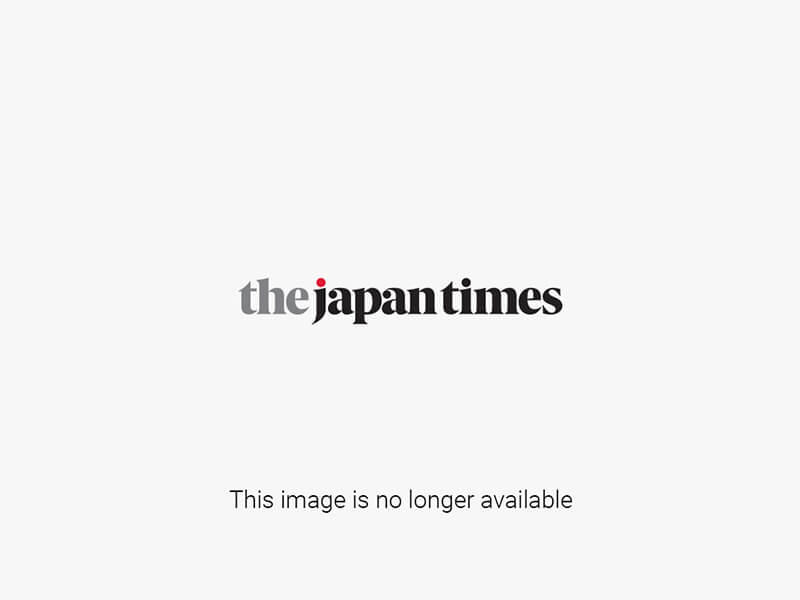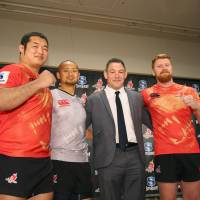With just over seven weeks to go until the Sunwolves make their Super Rugby debut against the Johannesburg-based Lions in Tokyo, the good news is the team finally have a coach and a full roster of players.
But the Dec. 21 announcement of Mark Hammett and the 34 players that make up his squad still left many questions unanswered.
And for those who have been watching Japanese rugby for many more years than there have been months since Japan's historic win over South Africa at the Rugby World Cup there is still an underlying feeling of foreboding.
As far as the playing personnel is concerned, the general view is the squad — which contains just 10 of the Brave Blossoms who shocked the world at RWC 2015 — lacks depth and that the management clearly did not learn from the problems Eddie Jones had when putting out a team of second stringers in the national team jersey.
Off the field, there are even more questions.
The Sunwolves don't have a training home of their own, they were, as of four days ago, still advertising for staff, and seem to have missed out on some great opportunities to really increase their fan base across Asia.
"What we can say about other team management appointments is that we are making progress toward the announcement of all of the team management," a Sunwolves spokesman told Kyodo News on Thursday.
Kyodo has been told the team will hop around Tokyo —training at the homes of Suntory Sungoliath, Toshiba Brave Lupus and Canon Eagles according to one source — rather than laying down roots in one location, even though this is supposedly a long-term venture and a side that technically has already been in existence for over a year.
Despite the official green light being given in November 2014, the team have so far listed just one member of its coaching staff — Hammett.
On the day it announced its squad, advertisements were placed on its website for four positions.
Potential team managers, analysts etc were supposed to apply by Jan. 5 on the understanding they are supposed to start on Jan. 10 on a six-month contract.
Kyodo knows of one applicant — a staffer from the Reds team that won the Super Rugby title in 2011. A fluent Japanese speaker, he tried to contact Hammett before Christmas through the Japan Super Rugby Association only to be told through a third party they could not contact their own head coach.
Having sent in his application via the website he had by Jan. 7 still not heard from anyone connected with the team.
He is not alone, though.
Johnny Gbenda Charles, the agent for Yamaha Jubilo and Malaysia lock Dineshvaran "Duke" Krishnan, contacted the Sunwolves last year asking that they consider the 27-year-old, one of the standout players in the Top League the last couple of seasons.
With the side playing three games in Singapore, Krishnan — a far better player than some of those named on Dec. 21 — would also have been a great PR asset to increase the team's fan base.
However, Gbenda Charles heard nothing back.
"We have and will continue to drive a player like Duke as the perfect player to represent the Sunwolves, which is a Japanese based side that represents Asia in Super Rugby," he told Kyodo.
"Duke is in the group of the best Asian born, bred and developed players and deserves his chance to play Super Rugby.
"For the growth of the game in Malaysia and Asia, Duke's involvement represents an inspirational and aspirational platform for the youth to belong to and work towards."
When asked by Kyodo why Krishnan had not been considered, a spokesman for the Sunwolves simply said, "As you can understand, it is hard to provide a comment on a specific player's selection."
The Singapore Sports Hub, the JSRA's partners in the island state, would no doubt agree with Gbenda Charles' last point.
Because in addition to providing a poster boy for the rugby playing population in the Malaysian peninsula, under the terms of the agreement it is understood that while the Sunwolves must pay for all their teams expenses in Singapore — as they are technically home games — the Sports Hub will take whatever money is made in ticket sales and merchandising.
That is if there is any, as so far nothing seems to have been produced ahead of the team's first game.
At a recent Top League game, rugby fans in Tokyo vented their anger at the JSRA after it closed two booths early at Prince Chichibu Memorial Ground, the home ground of the Sunwolves and a field that has taken some flack on social media in recent weeks due to its below standard playing surface.
It seems the JSRA staff had not counted on so many fans attending — despite it being the last week of the regular season and Japan heartthrob Ayumu Goromaru's first appearance in the capital since the Rugby World Cup — and after running out of promotional leaflets they simply closed the booths down.
The huge surge in popularity in rugby in Japan in recent months needs to keep gaining momentum as the nation builds towards Rugby World Cup 2019, which it will host.
While Japan's past performances didn't exactly instill confidence ahead of last year's tournament, the Brave Blossoms had the ultimate professional to lead them in Jones.
An amateur approach off the Super Rugby field and poor performances on it, however, could see the bubble burst.
The Australian's decision to quit the Sunwolves in August should have been a warning sign. Sadly it still doesn't seem to have been taken onboard.




